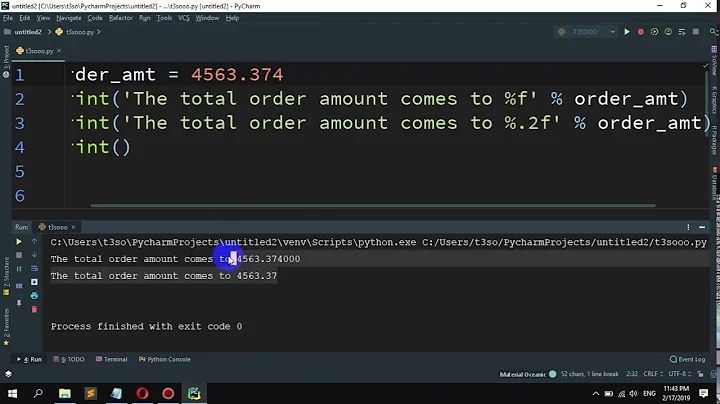Python Decimal to String
Solution 1
Use the str() builtin, which:
Returns a string containing a nicely printable representation of an object.
E.g:
>>> import decimal
>>> dec = decimal.Decimal('10.0')
>>> str(dec)
'10.0'
Solution 2
Use the string format function:
>>> from decimal import Decimal
>>> d = Decimal("0.0000000000000123123")
>>> s = '{0:f}'.format(d)
>>> print(s)
0.0000000000000123123
If you just type cast the number to a string it won't work for exponents:
>>> str(d)
'1.23123E-14'
Solution 3
Note that using the %f string formatting appears to either convert to a float first (or only output a limited number of decimal places) and therefore looses precision. You should use %s or str() to display the full value stored in the Decimal.
Given:
from decimal import Decimal
foo = Decimal("23380.06198573179271708683473")
print("{0:f}".format(foo))
print("%s" % foo)
print("%f" % foo)
Outputs:
23380.06198573179271708683473
23380.06198573179271708683473
23380.061986
(ed: updated to reflect @Mark's comment.)
Solution 4
import decimal
dec = decimal.Decimal('10.0')
string_dec = str(dec)
Solution 5
Almost all the built-ins work on the Decimal class as you would expect:
>>> import decimal
>>> dec=decimal.Decimal('10.0')
A string:
>>> str(dec)
'10.0'
A float:
>>> float(dec)
10.0
An int:
>>> int(dec)
10
Object representation (as it would be in the interactive interpreter):
>>> repr(dec)
"Decimal('10.0')"
Rational number:
>>> import fractions
>>> fractions.Fraction(decimal.Decimal('0.50'))
Fraction(1, 2)
Related videos on Youtube
gfrung4
Updated on July 09, 2022Comments
-
 gfrung4 almost 2 years
gfrung4 almost 2 yearsThere are tons of topics on here that explain how to convert a string to a decimal, but how do I convert a decimal back to a string?
Like if I did this:
import decimal dec = decimal.Decimal('10.0')How would I take
decand get'10.0'(a string) out?-
Marcin almost 12 yearsPlease consult the API documentation before posting a question like this. You will also get good results from simply firing up python, and trying things out.
-
-
Greg Hewgill almost 12 years+1 Important to note that
str()works on pretty much anything in Python. -
 John La Rooy almost 12 years@Greg, and that's the way it should be :)
John La Rooy almost 12 years@Greg, and that's the way it should be :) -
 zinking almost 12 yearsbecause most types has the str method implemented
zinking almost 12 yearsbecause most types has the str method implemented -
Saikiran Yerram about 9 yearsThis is somewhat correct and would fail for decimal strings like
0.0000000000000123123and will print1.23123E-14. @Matthew has it right (answer below) using the string format function. -
Gareth Latty about 9 years@SaikiranYerram That rather depends on whether you consider that to be a reasonable representation of the number. It's unclear what the use case is in the OP, but indeed, if the user doesn't want that notation, the string formatting approach would produce better results.
-
Mark Dickinson over 5 yearsYou're correct that
%f-based formatting should be avoided, but I don't see any answers recommending that approach. Note thatformat(foo, 'f')or"{0:f}".format(foo)don't convertfootofloator lose precision. -
eraoul over 4 years@SaikiranYerram I don't see why you define an exponential notation output to be "fail"; that might indeed be the desired output.
-
eraoul over 4 yearsI don't see anything wrong with E notation in output.
-
Jure Cerjak about 4 years@eraoul Both are valid, depends on the use case (e.g. you might need to send the value to an external API, which doesn't accept values in E notation). If it's just for printing/logging, then I guess it's a matter of preference.




![String Formatting [HackerRank] | Python | rjust() | oct() | hex() | bin()](https://i.ytimg.com/vi/YDz6QwcnRdk/hq720.jpg?sqp=-oaymwEcCNAFEJQDSFXyq4qpAw4IARUAAIhCGAFwAcABBg==&rs=AOn4CLDGtNH9CQlp1Ec8kO0TwfE0Z1mOgQ)

